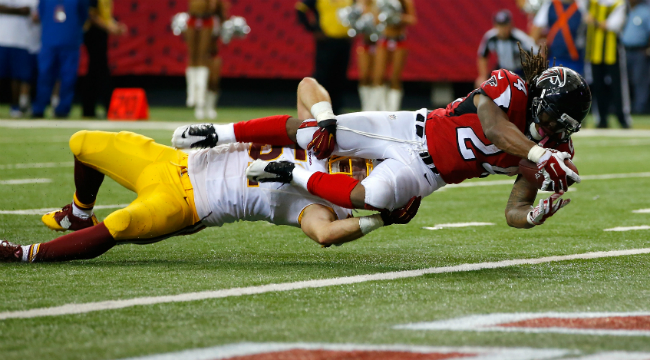
For a minute there, everyone was ready to start the argument again. Devonta Freeman made a glorious catch and dive into the endzone to take the lead late in the Atlanta Falcons-Washington Redskins game on Sunday. Except, somehow it wasn’t a catch. We’ve been through this before, and the sports talk lines would surely light up again over this.
Thankfully, Freeman punched it into the endzone on a running play just moments later, so no one has to wonder if the call cost the Falcons the game. But for those who might have wanted the extra exposure to push the discussion on what constitutes a catch forward (or those who just want to watch people go mad with rage), it was a missed opportunity. Because seriously, how is that not a catch?
The NFL rulebook‘s definition of a catch is long and complicated, but the passage that applies to this situation is the one about going to the ground while securing a catch. Here’s how the NFL defines “going to the ground”:
Item 1. Player Going to the Ground. A player is considered to be going to the ground if he does not remain upright long enough to demonstrate that he is clearly a runner. If a player goes to the ground in the act of catching a pass (with or without contact by an opponent), he must maintain control of the ball until after his initial contact with the ground, whether in the field of play or the end zone. If he loses control of the ball, and the ball touches the ground before he regains control, the pass is incomplete. If he regains control prior to the ball touching the ground, the pass is complete.
So Freeman, according to the referees’ interpretation of the rules, hadn’t clearly demonstrated that he was a runner, so when he dove across the goal line (which is definitely something a runner would do) and lost the ball hitting the ground, he didn’t complete the process of a catch.
That phrase — “process of the catch” — has been a point of contention and confusion since Calvin Johnson had this play ruled incomplete:
Even more confusingly, this play happened before the requirement that a player demonstrate he’s a runner was added in the rulebook this past offseason. Before then, the rules required a player demonstrate an “act common to the game” — more commonly referred to as a “football move” — to prove possession. While you could argue that defining a runner is easier than defining a football move, it still wouldn’t solve the main issue: the rules run contrary to common sense about what defines a catch.
Megatron couldn’t possibly establish himself as a runner if he catches the ball in the end zone, which means the play would still be an incomplete pass by the letter of the law today. It’s like the NFL has spent so many words defining a catch that they’ve legislated common sense out of the game. At the risk of using a cliched metaphor, a catch should be like hardcore porn: We know it when we see it. Like Dez Bryant’s play in last postseason.
https://www.youtube.com/watch?v=FsXwNVkWTOY
That was actually very similar to Freeman’s play. Both players made a contested catch, took a few steps and lost the ball when they dove for the endzone. Freeman’s might actually have been more obviously a catch, as he dove all the way into the endzone and looked more balanced. I mean, seriously, shouldn’t the play have ended when he crossed the plane? Both players did things runners would do (although Bryant’s play didn’t occur under this rule, the NFL clarified that it still wouldn’t have counted), but I guess not long enough to satisfy the referees?
At this point, there’s no easy fix for this mess. The NFL can’t or won’t make a rule definition intentionally more vague than it was before to give refs more leeway; it doesn’t fit with the authoritarian image they’ve carefully crafted. If more controversy arises, the NFL will deal with it the way it always does: with poorly-directed blunt force, like trying to kill a spider with a sledgehammer. Be thankful Devonta Freeman eventually scored, and not just for justice’s sake. Be thankful because another round of debate would have meant another useless tweaking of a rule that’s already so byzantine, it doesn’t remotely apply to the real world.






